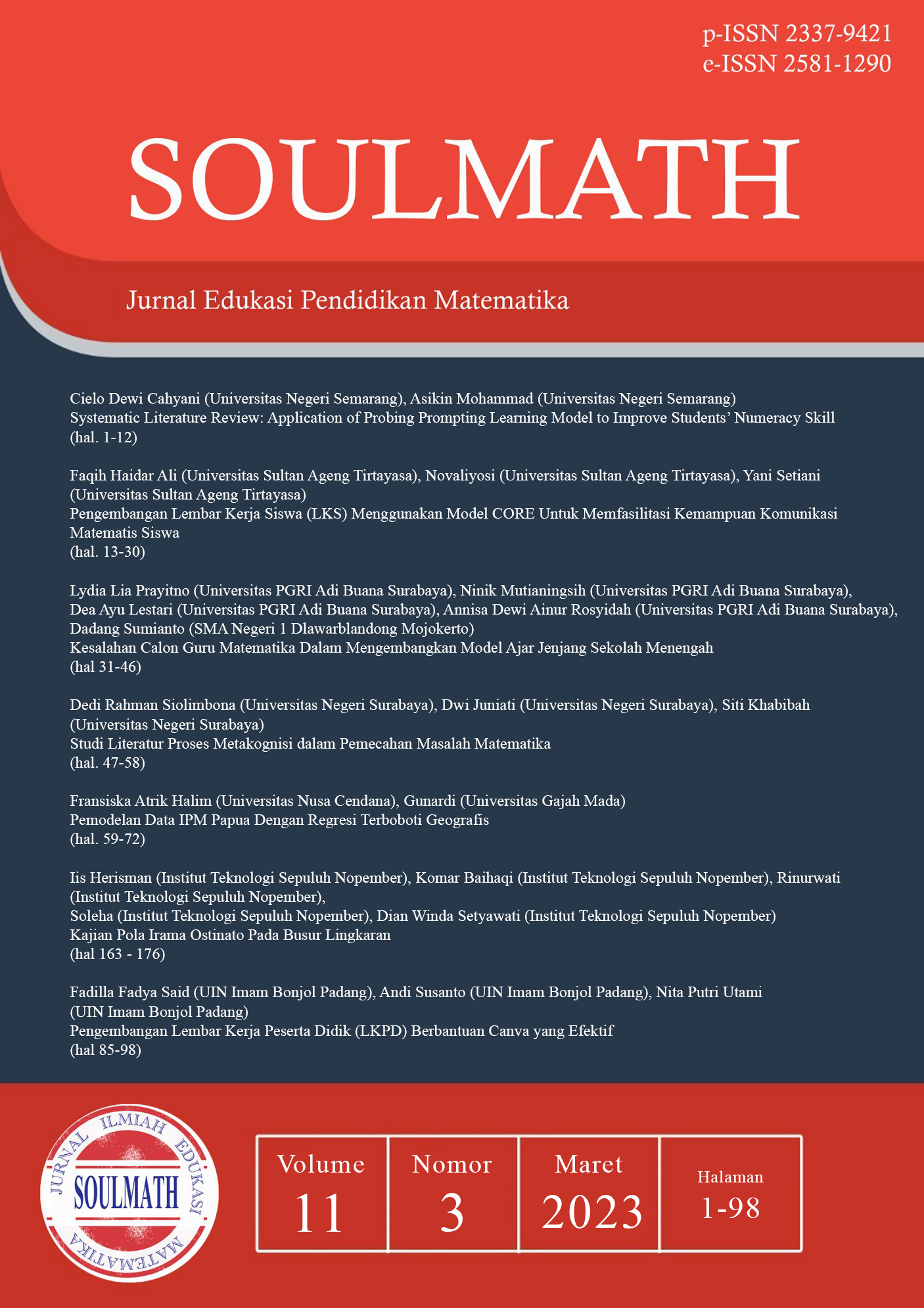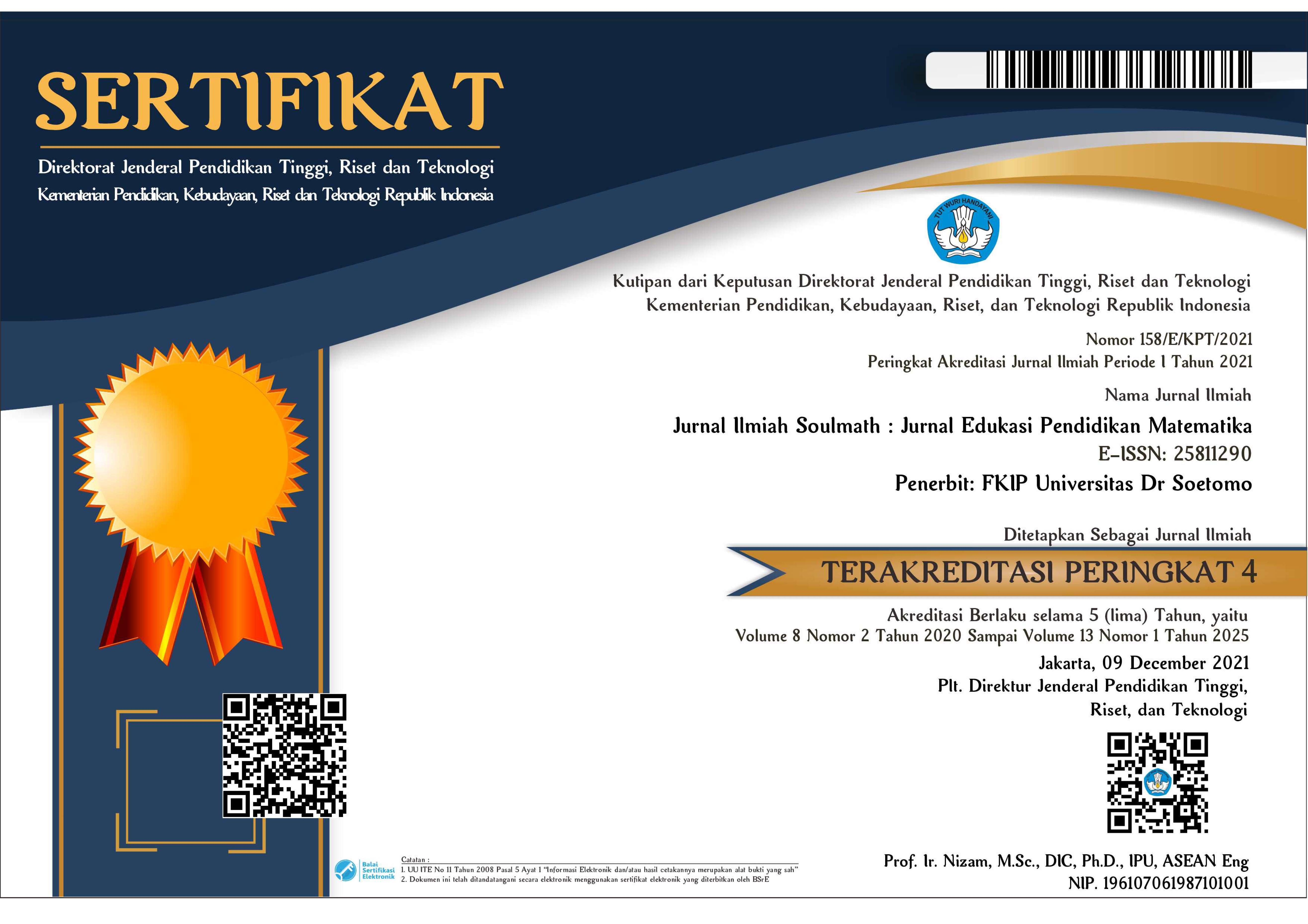Kesalahan Calon Guru Matematika Dalam Mengembangkan Modul Ajar Jenjang Sekolah Menengah
 Abstract views: 361
,
Abstract views: 361
,
 5694 Publish (Bahasa Indonesia) downloads: 380
5694 Publish (Bahasa Indonesia) downloads: 380
Abstract
Teachers are educators who are required to have pedagogical, professional, social, and personality competencies. The role of educational institutions prepares prospective teachers to have these competencies. This paper is a descriptive study involving 25 prospective mathematics teachers who program field experience courses in schools. This course requires a prospective teacher to develop mathematics teaching modules for the high school level. So, the purpose of this study describes the mistakes of prospective mathematics teachers in developing mathematics teaching modules. The data is collected through the documentation by collecting mathematics teaching modules developed by the prospective teachers, and then analyzed based on three components, such are general information, core information, and attachments. The results of this study indicate that the mistakes made by prospective teachers in the general information component happen in determining the model, approach, learning method, diagnostic results, time duration, and meetings assigned. Then, the mistakes in core components happen when prospective teachers determine meaningful understanding, triggering questions, designing assessments, not explaining learning syntax, scientific approach, 21st-century skills, Pancasila student profiles, and differentiation. Furthermore, in the attachment component, the mistakes happen in the development of LKPD which is not yet constructivist and can be done individually, has not developed appropriate learning media, has not been appropriate in developing remedial and enrichment programs, and has not written glossarial in mathematics teaching module.
Keywords: mistakes, development, teaching module, Merdeka curriculum
Downloads
References
M. Gokalp, “Investigating classroom teaching competencies of pre service elementary mathematics teachers,” Eurasia J. Math. Sci. Technol. Educ., vol. 12, no. 3, pp. 503–512, 2016, doi: 10.12973/eurasia.2016.1296a.
Y. Guo, C. M. D. Connor, Y. Yang, A. D. Roehrig, and F. J. Morrison, “The effects of teacher qualification, teacher self-efficacy, and classroom practices on fifth graders’ literacy outcomes,” Elem. Sch. J., vol. 113, no. 1, pp. 3–24, 2012, doi: 10.1086/665816.
M. Turmuzi and E. Kurniawan, “Kemampuan Mengajar Mahasiswa Calon Guru Matematika Ditinjau dari Technological Pedagogical and Content Knowledge (TPACK) pada Mata Kuliah Micro Teaching,” J. Cendekia J. Pendidik. Mat., vol. 5, no. 3, pp. 2484–2498, 2021, doi: 10.31004/cendekia.v5i3.881.
E. Risdianto, “Analisis Pendidikan Indonesia di Era Revolusi Industri 4.0,” Res. Gate, vol. April, no. January, pp. 1–16, 2019.
T. N. Putri and D. Puspasari, “Pengembangan Bahan Ajar Interaktif Berbasis CASE (Creative, Active, Systematic, Effective) pada Mata Pelajaran Korespondensi,” Edukatif J. Ilmu Pendidik., vol. 4, no. 3, pp. 4956–4967, 2022, doi: 10.31004/edukatif.v4i3.2969.
E. Rindayati, C. A. D. Putri, and R. Damariswara, “Kesulitan Calon Pendidik dalam Mengembangkan Perangkat Pembelajaran pada Kurikulum Merdeka,” PTK J. Tindakan Kelas, vol. 3, no. 1, pp. 18–27, 2022, doi: 10.53624/ptk.v3i1.104.
P. S. Rosmana, S. Iskandar, H. Fauziah, N. Azzifah, and W. Khamelia, “Kebebasan dalam Kurikulum Prototype,” As-Sabiqun, vol. 4, no. 1, pp. 115–131, 2022, doi: 10.36088/assabiqun.v4i1.1683.
S. Sufyadi, T. Y. Harjatanaya, P. Adiprima, M. R. Satria, A. Andiarti, and I. Herutami, Panduan pengembangan projek penguatan profil pelajar Pancasila jenjang pendidikan dasar dan menengah (SD/MI, SMP/MTs, SMA/MA). Jakarta: Kebudayaan, Riset, dan Teknologi, 2021.
L. U. Sadieda, B. Wahyudi, R. Dwi Kirana, S. Kamaliyyah, and V. Arsyavina, “Implementasi Model Blended Learning Pada Pembelajaran Matematika Berbasis Kurikulum Merdeka,” JRPM (Jurnal Rev. Pembelajaran Mat., vol. 7, no. 1, pp. 55–72, 2022, doi: 10.15642/jrpm.2022.7.1.55-72.
D. Aprima and S. Sari, “Cendikia : Media Jurnal Ilmiah Pendidikan Analisis Penerapan Pembelajaran Berdiferensiasi Dalam Implementasi Kurikulum Merdeka Pada Pelajaran Matematika SD,” Cendikia Media J. Ilm. Pendidik., vol. 13, no. 1, pp. 95–101, 2022.
E. Y. Rahayu, N. Nurjati, and S. Khabib, “Kesiapan Profesionalisme Guru Bahasa Inggris SMK Dalam Implementasi Kurikulum Merdeka,” “Menuju Indones. Bangkit dan Tangguh melalui Ris. dan Pengabdi. Berbas. Teknol. Kesiapan, no. April, pp. 1473–1484, 2022.
U. Maulida, “Pengembangan Modul Ajar Berbasis Kurikulum Merdeka,” Tarbawi, vol. 5, no. 2, pp. 130–138, 2022, [Online]. Available: https://stai-binamadani.e-journal.id/Tarbawi.
Rahimah, “Peningkatan Kemampuan Guru SMP Negeri 10 Kota Tebingtinggi dalam Menyusun Modul Ajar Kurikulum Merdeka melalui Kegiatan Pendampingan Tahun Ajaran 2021/2022,” J. ansiru PAI, pp. 92–106, 2022.
P. Nurhayati, M. Emilzoli, and D. Fu’adiah, “Peningkatan Keterampilan Penyusunan Modul Ajar Dan Modul Proyek Penguatan Profil Pelajar Pancasila Kurikulum Merdeka Pada Guru Madrasah Ibtidaiyah,” JMM (Jurnal Masy. Mandiri), vol. 6, no. 5, pp. 1–9, 2022, doi: 10.31764/jmm.v6i5.10047.
R. Setiawan, N. Syahria, F. D. Andanty, and S. Nabhan, “Pengembangan Modul Ajar Kurikulum Merdeka Mata Pelajaran Bahasa Inggris Smk Kota Surabaya,” J. Gramaswara, vol. 2, no. 2, pp. 49–62, 2022, doi: 10.21776/ub.gramaswara.2022.002.02.05.
N. S. Sukmadinata, Metode Penelitian Pembelajaran, 12th ed. Bandung: PT Remaja Rosdakarya, 2017.
Sugiyono, Metode Penelitian Kuantitatif Kualitatif dan R&D. Bandung: PT. Alfabeta, 2008.
R. Pujiastuti and L. I. Kulup, “Meningkatkan kemampuan menyusun rencana pelaksanaan pembelajaran,” no. 3, pp. 122–135, 2019.
F. Zabadi, “Menelisik Merdeka Belajar dalam Bahan Ajar Bahasa Indonesia Kurikulum 2013,” in Seminar Nasional SAGA, 2021, vol. 3, no. 1, pp. 154–164.
P. Alfitri and J. Dahlan, “Implementasi Standar Proses Kurikulum Sekolah Penggerak dalam Pembelajaran Matematika | Alfitri | JIPM (Jurnal Ilmiah Pendidikan Matematika),” JIPM (Jurnal Ilm. Pendidik. Mat., vol. 11, no. 1, pp. 51–66, 2022, [Online]. Available: http://e-journal.unipma.ac.id/index.php/jipm/article/view/11789.
R. Pujiastuti and L. I. Kulup, “Penyusunan Instrumen Penilaian Kognitif Berbasis HOTS Melalui Problem Based Learning dan Peer Assessment,” Indones. Lang. Educ. Lit., vol. 7, no. 1, p. 88, 2021, doi: 10.24235/ileal.v7i1.9058.
D. Kusmaharti and L. Prayitno, “Analisis kesulitan guru SD di Kabupaten Sumenep dalam mengajarkan tema pada Kurikulum 2013,” Inovasi, vol. 19, no. 1, pp. 24–32, 2017.
F. D. P. Nesri and Y. D. Kristanto, “Pengembangan Modul Ajar Berbantuan Teknologi untuk Mengembangkan Kecakapan Abad 21 Siswa,” AKSIOMA J. Progr. Stud. Pendidik. Mat., vol. 9, no. 3, p. 480, 2020, doi: 10.24127/ajpm.v9i3.2925.







